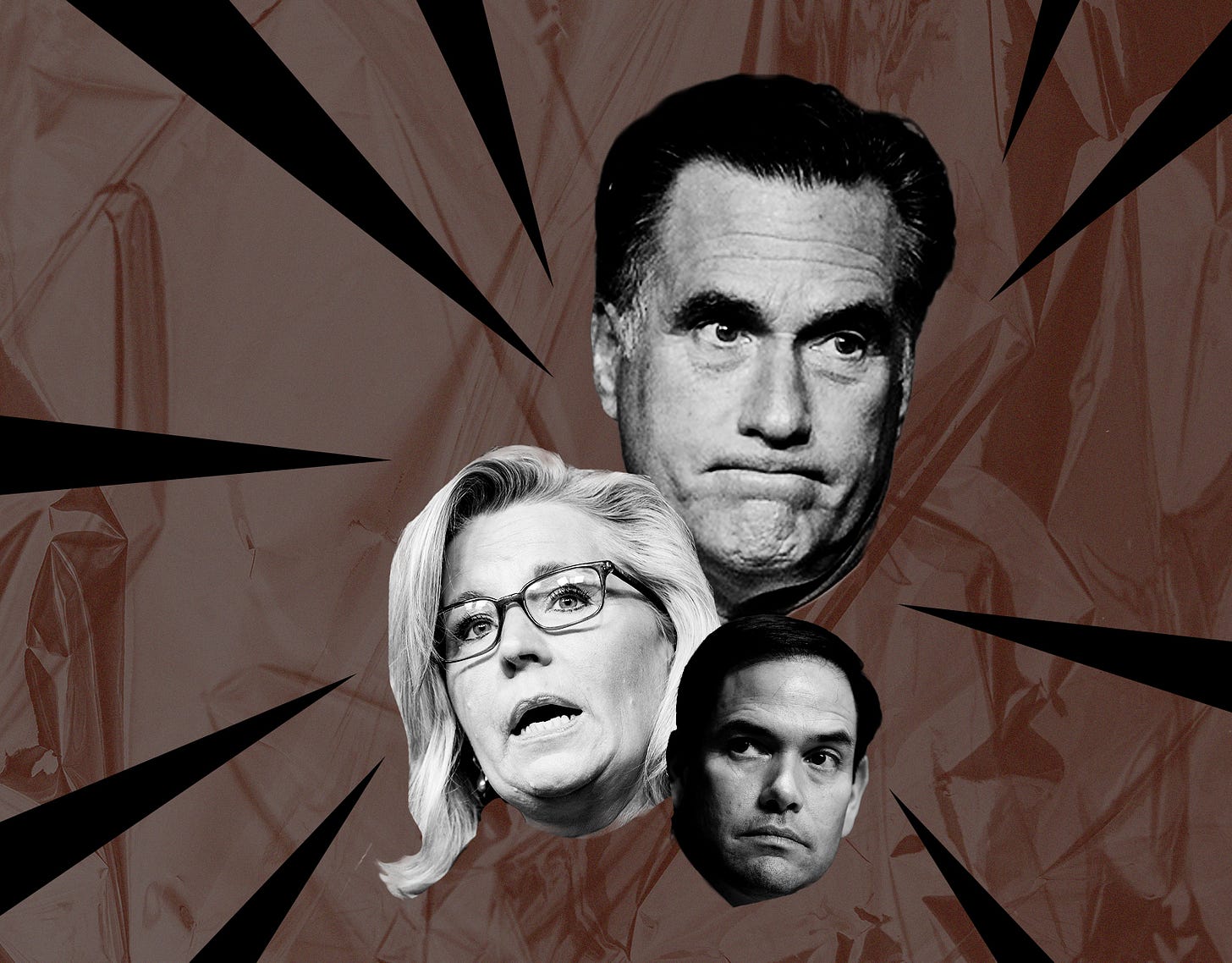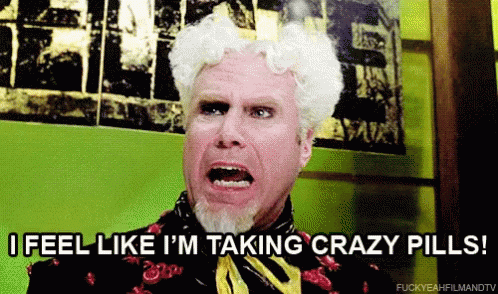What Do You Want Republicans To Do?
It isn't enough to contradict an authoritarian. You have to oppose him.

1. The Strongman
After Trump’s press conference last night where he openly floated the idea of flouting the post-election transfer of power, I went a little nuts.
The piece I wrote is here and while it’s probably 10 percent overwrought, I still think it’s worth your time on the grounds that when people tell you who they are, you should believe them.
After Trump made his statement, a couple of elected Republicans stepped up to contradict him. And good for them. Mitt Romney, Liz Cheney, Marco Rubio, Ben Sasse, and a couple others all said some version of, No; Trump is wrong; there will be a peaceful transfer of power.


I’m grateful for that. Thank you.
And also: This is nowhere near good enough.
Now I understand that by picking on Romney and Sasse, I’m hitting the actual Good Guys. They’re literally further out on the limb than any other consequential Republicans.
Most Republicans just did the Strategic Silence routine. At least one of them went full anti-anti. (See if you can guess who without clicking the link.)
So I get that. I’m being unfair. What I ought to be doing is giving Romney and Sasse credit for contradicting Trump.
But I can’t bring myself to do it.
Because by refusing to say the logical conclusion to their contradictions out loud, they’re abdicating their responsibility to protect the republic.
Look: If the president says something that is both “unthinkable” and “unacceptable” then what should the country do with said president?
If a president routinely “says crazy stuff” then what should political actors—and the citizenry—do about him?
Should they support his reelection?
Or should they do everything in their power to further his defeat?
No one expects Matt Gaetz to know better. He is what he is.
Guys like Romney and Sasse do know better. They don’t even really hide this understanding. So why can they only raise their flag half-way in public?
The old rule in political debate was that you were supposed to argue about ideas and never question peoples’ motives.
But I’m at the point where the only thing I really care about anymore are motives.
If you truly believe that Donald Trump is making America great again and you love the results of his presidency, then God bless you. I don’t agree; but I can live with that.
What drives me crazy is all the people who understand exactly how dangerous Trump is and yet either refuse to say it out loud or to follow the logic of this understanding to its terminus.
I don’t understand it. This is me, basically every day:

And that’s why the elevator pitch for The Bulwark has always been:
We tell you what we really think.
2. Turnout
I had a long conversation with a friend in the polling business over the weekend and I pushed her pretty hard on the idea of turnout.
I didn’t a prediction. What I wanted was an explanation as to how much turnout uncertainty influences polling uncertainty.
And her response is worth sharing.
As I’ve said here multiple times, turnout in presidential elections has been roughly stable since the 2004 election. (The 2000 election was the last pre-polarized race before Bush v. Gore and 9/11 turned American politics into a hellscape.)
Now, the word “roughly” is doing a lot of work there. In 2004, 122 million people voted. In 2008, the number was 130 million. Eight million people is a lot. But from election to election, even when turnout moved up or down, it was always in the same basic ballpark. Again: roughly.
The big question about 2020 is whether the coronavirus changes turnout not by a rough amount, but by a giant amount. We had 129 million votes in 2016. That’s the baseline for all of the modeling.
So does turnout stay in the same basic valence? Or does it jump—or fall—to something crazy. If you told me that you just came back from the future and that 150 million people had voted in the 2020 election, I wouldn’t be all that surprised. But by the same token, if you told me that only 110 million people had voted, I wouldn’t be all that surprised, either.
Both super-high and super-low turnout seem possible.
What I asked my pollster friend was: What happens to the reliability of polling in either the super-high or super-low turnout scenarios.
She said that if turnout was super low, then the odds of a polling error becomes larger. Because once you start cutting out the number of people who show up, then the chances of your sample having been representative drops.
But on the other hand, if the turnout is exceptionally high—then the pollsters become more confident. Because it means that their samples have a greater chance of being representative. More is more.
This is a useful lens in deciding how much you want to “trust” the polls.
Polling averages are powerful predictors of results. But they’re not perfect. If you are concerned about the size of the potential difference between the final polling average and the results in a race, the larger the turnout, the more confidence you should have in the polls.
And vice versa.
3. Ambulance Chasers
If you wait long enough, eventually you will get to sample life’s greatest delicacy: Watching bad things happen to bad people:
Steve Barnes was furious. Over the past 25 years, he had helped turn a small-time Buffalo personal-injury law firm into a New York institution, one with eye-popping profits and an empire of advertisements so widespread you wondered if everyone who got into an accident in the state would end up as its client. But now everything he’d built was at risk of falling apart. How could anyone, especially his own partner, Ross Cellino, want to turn off the rivers of green that flowed into their coffers? It was April 2017, and Barnes’s emails boiled with frustration, each one a verbal roundhouse to the partner yoked to him by an ampersand and thousands of TV, radio, and billboard spots.
“We have made 10+ each for the last few years, with nothing but blue sky in the future. What part of THAT are you unhappy with?” Barnes wrote his partner. (That “10+”: That’s millions of dollars, each.) “You know any other lawyers who are making 10 a year? I don’t.”




